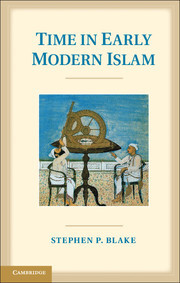Description
Time in Early Modern Islam
Calendar, Ceremony, and Chronology in the Safavid, Mughal and Ottoman Empires
Author: Blake Stephen P.
Stephen P. Blake compares the Islamic concept of time across the empires of the Safavids, Ottomans and Mughals.
Language: English
Subject for Time in Early Modern Islam:
Approximative price 97.81 €
In Print (Delivery period: 14 days).
Add to cart
Time in Early Modern Islam
Publication date: 02-2013
Support: Print on demand
Publication date: 02-2013
Support: Print on demand
Approximative price 32.87 €
In Print (Delivery period: 14 days).
Add to cart
Time in Early Modern Islam
Publication date: 08-2017
Support: Print on demand
Publication date: 08-2017
Support: Print on demand
Description
/li>Contents
/li>Biography
/li>
The prophet Muhammad and the early Islamic community radically redefined the concept of time that they had inherited from earlier religions' beliefs and practices. This new temporal system, based on a lunar calendar and era, was complex and required sophistication and accuracy. From the ninth to the sixteenth centuries, it was the Muslim astronomers of the Ottoman, Safavid and Mughal empires who were responsible for the major advances in mathematics, astronomy and astrology. This fascinating study compares the Islamic concept of time, and its historical and cultural significance, across these three great empires. Each empire, while mindful of earlier models, created a new temporal system, fashioning a new solar calendar and era and a new round of rituals and ceremonies from the cultural resources at hand. This book contributes to our understanding of the Muslim temporal system and our appreciation of the influence of Islamic science on the Western world.
1. Safavid, Mughal and Ottoman empires; 2. Calendar; 3. Ceremony; 4. Chronology: era; 5. Chronology: millenarian.
Dr Stephen P. Blake is Professor Emeritus at the University of Minnesota and St Olaf College, Minnesota. His books include Shahjahanabad: The Sovereign City in Mughal India, 1639–1739 (Cambridge, 2002) and Half the World: The Social Architecture of Safavid Isfahan, 1590–1722 (1999).
© 2024 LAVOISIER S.A.S.
These books may interest you

A History of Islamic Societies 109.04 €



